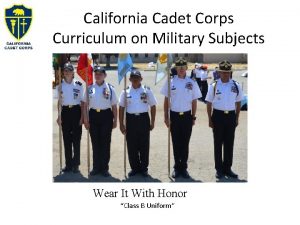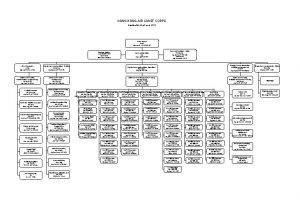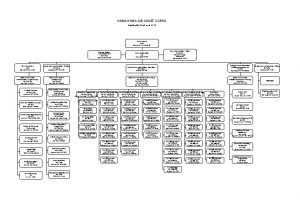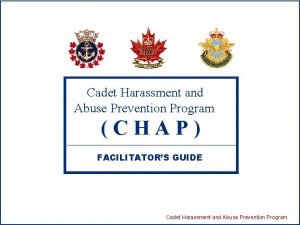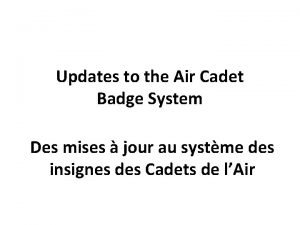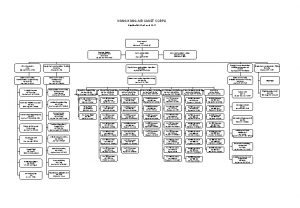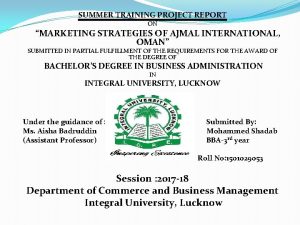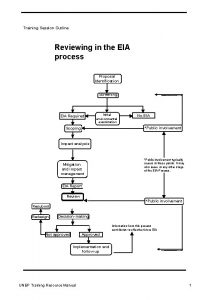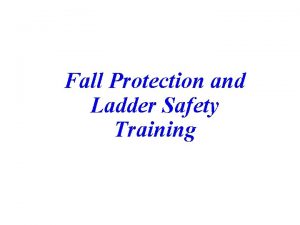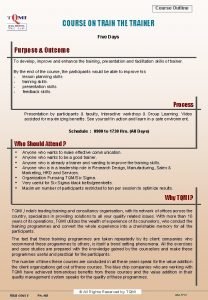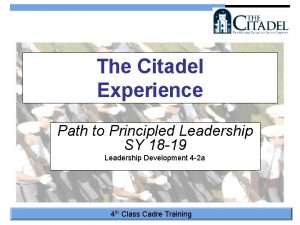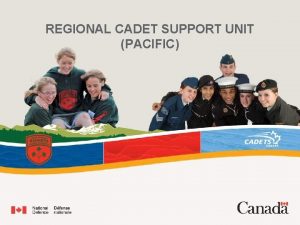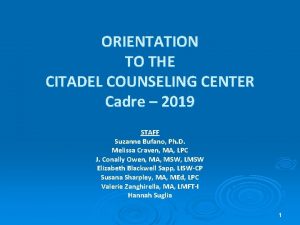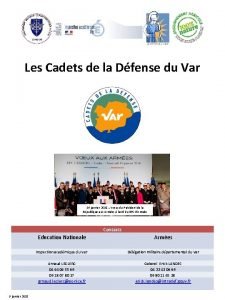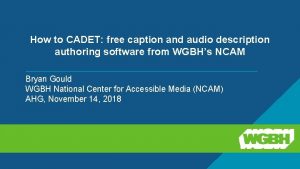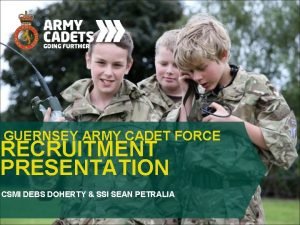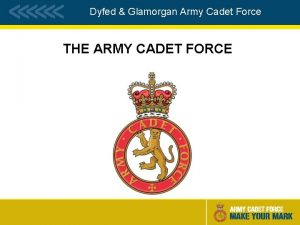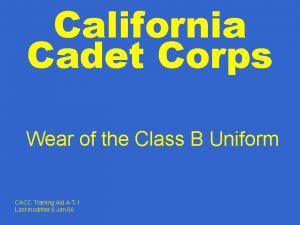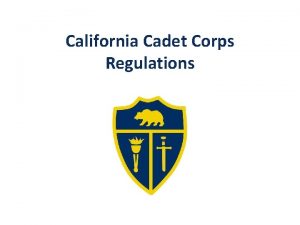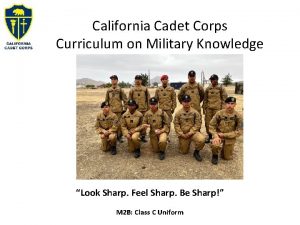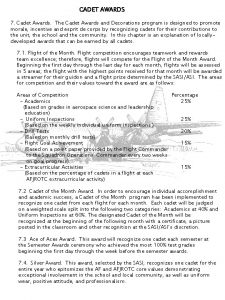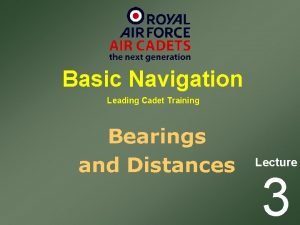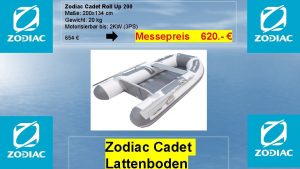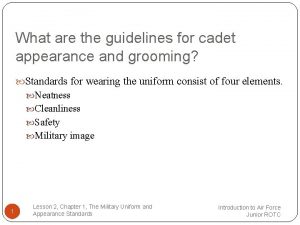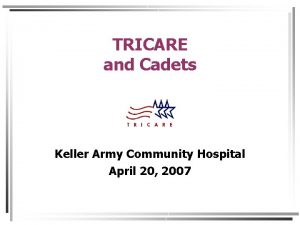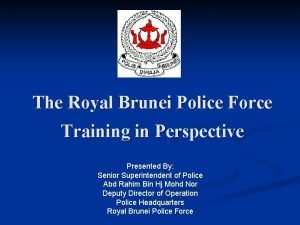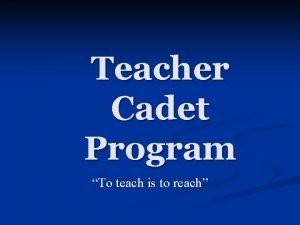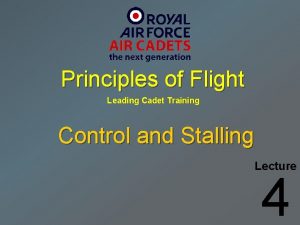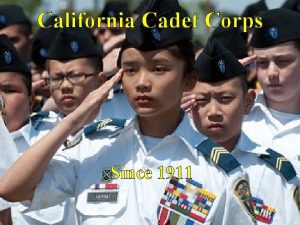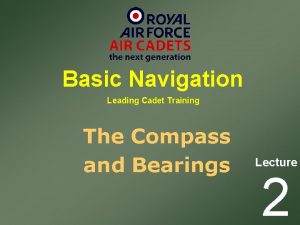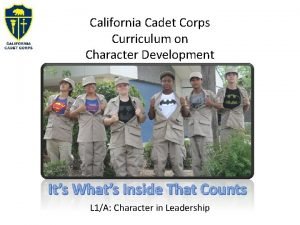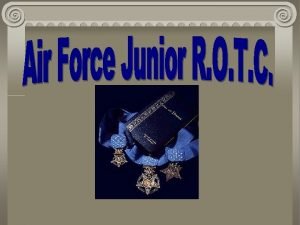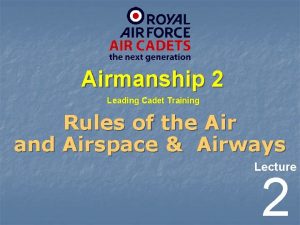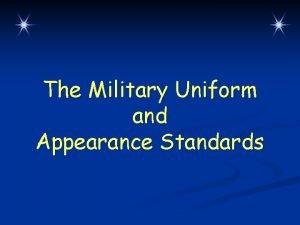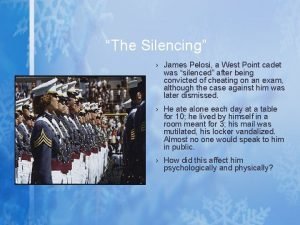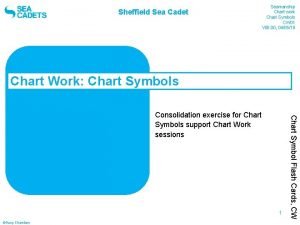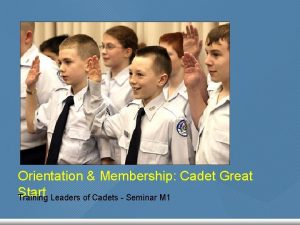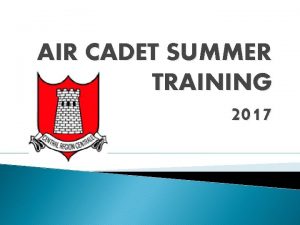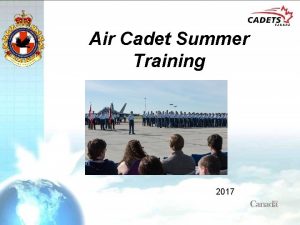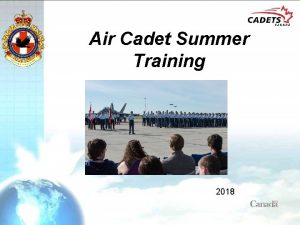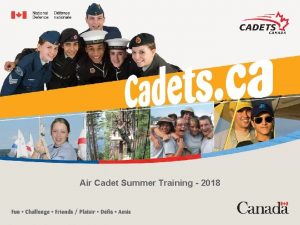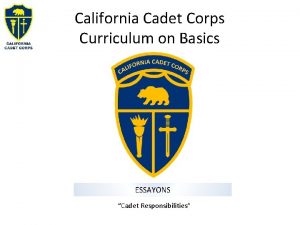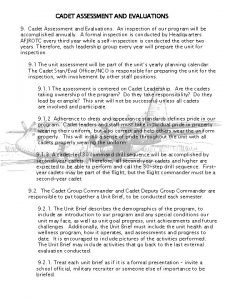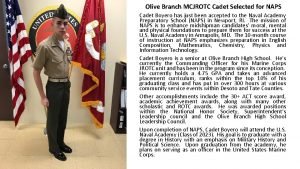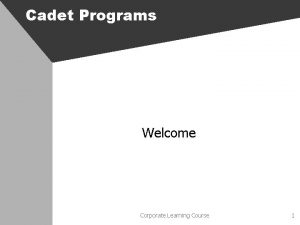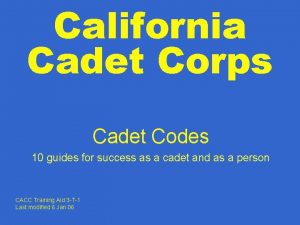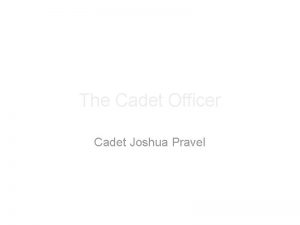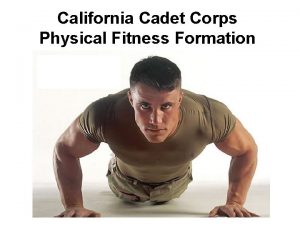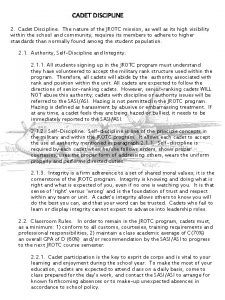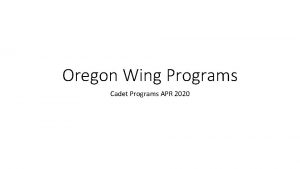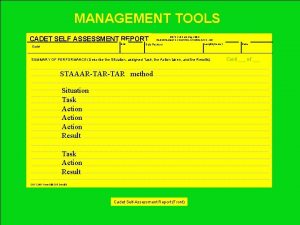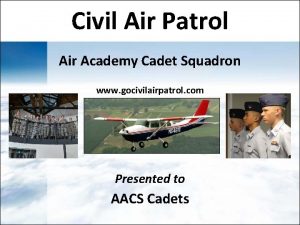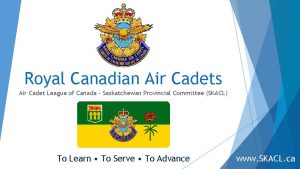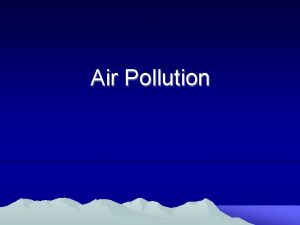Air Cadet Summer Training 2017 Outline What is

























































- Slides: 57

Air Cadet Summer Training 2017

Outline What is Air Cadet Summer Training? What courses are available? Who can attend? Where is summer training conducted? Who conducts & supervises the courses? How do cadets get to and from the centres? How do cadets apply? How do cadets get selected? What is life like at the Cadet Training Centre (CTC)?

Aim Of Summer Training Ø Provide instruction and opportunities to develop advanced knowledge and skills in specialized activities Ø To develop instructors and leaders for these activities Ø To provide further opportunities to employ the general knowledge and skills obtained through the sqn program

Categories of Training General Training Basic Intermediate /Instructor Advanced Training 2 -week course designed to introduce cadets to summer training 3 -week courses designed to teach the knowledge & skills in specialized activities 6 -week courses designed to develop instructor/leaders in specialized activities 6 -week courses designed to advance senior cadets’ leadership and specialized skills

General Training Courses Descriptions 2 Weeks - Cold Lake CTC (Cold Lake, AB) The aim of the General Training course is to introduce air cadets to the CTC environment and specialty training qualifications including: Aviation Marksmanship Sports and Fitness Survival Ceremonial Leadership Music CAF Familiarization

General Training Courses Who can attend? Ø 12 and 13 years of age Ø Completed Level One at the Sqn Ø Physically fit and in good health Ø Recommended by the Sqn Commanding Officer and selected by the RCSU

General Training Courses Course Dates 10 July – 21 July 23 July - 4 Aug 7 Aug - 18 Aug Specific serials and training centres locations will be allocated to sqns Course dates do not include travel days. Cadets must be prepared to travel up to 2 days prior and after course dates

Basic Courses (3 weeks) Ø Ø Ø Ø Basic Drill & Ceremonial Basic Fitness & Sports Basic Aviation Technology and Aerospace Basic Survival Military Band - Basic Musician Pipe Band - Basic Musician

Basic Courses Who can attend? Ø 13 and 14 years of age Ø Completed Level two at the Sqn Ø Physically fit and in good health Ø Recommended by the Sqns Commanding Officer and selected by the RCSU

Basic Courses Course Dates 3 Weeks 10 July - 28 July 31 July - 18 August Specific serials and training centres locations will be allocated to corps Course dates do not include travel days. Cadets must be prepared to travel up to 2 days prior and after course dates.

Basic Courses Descriptions Basic Fitness and Sports (Cold Lake CTC) Ø Ø Ø Become a Fitness & Sports Assistant Develop a personal fitness routine Lead warm up and cool down sessions Assist with the cadet fitness assessment Assist with recreational / team sports All Basic Courses are 3 weeks long

Basic Courses Descriptions Basic Drill and Ceremonial (Vernon CTC) Develop peer leadership skills Ø Lead team-building activities Ø Command a squadron on parade Ø Execute rifle drill Ø All Basic Courses are 3 weeks long

Basic Courses Descriptions Basic Aviation (Cold Lake CTC) Ø Develop skills in the fundamentals of aviation in various areas including principles of flight, meteorology and propulsion. All Basic Courses are 3 weeks long

Basic Courses Descriptions Basic Aviation Technology and Aerospace (Gimli CFTC) Ø Develop in cadets the fundamentals of aerospace, airport operations and aircraft manufacturing and maintenance. All Basic Courses are 3 weeks long

Basic Courses Descriptions Basic Survival (Cold Lake CTC) Develop survival skills through practical exercises Ø Participate in ground search and rescue Ø Develop skills in ground navigation Ø All Basic Courses are 3 weeks long

Basic Courses Descriptions Military Band – Basic Musician (Quadra) Pipe Band – Basic Musician (Rocky Mtn) Develop music skills and music theory knowledge Ø Drill and ceremonial for military or pipe band. Ø All Basic Courses are 3 weeks long

Intermediate/Instructor Courses Ø Ø Ø Ø Drill & Ceremonial Instructor Fitness & Sports Instructor Air Rifle Marksmanship Instructor Survival Instructor Advanced Aviation Military Band - Intermediate Musician Pipe Band - Intermediate Musician

Intermediate/Instructor Courses Who can attend? Ø 14 to 16 years of age Ø Completed Level Three 3 at the sqn Ø Be physically fit and in good health Ø Be recommended by the Sqn Commanding Officer and selected by the RCSU

Intermediate/Instructor Courses Course Dates 6 Weeks 10 July - 18 August Course dates do not include travel days. Cadets must be prepared to travel up to 2 days prior and after course dates.

Intermediate/Instructor Courses Course Descriptions Drill & Ceremonial Instructor (Vernon CTC) To develop advanced drill and ceremonial related specialist skills and knowledge that will allow the cadet to perform the duties of a specialist instructor and team leader for ceremonial activities Ø To further develop skills learned in the sqn orogram Ø

Intermediate/Instructor Courses Course Descriptions Fitness and Sports Instructor (Cold Lake CTC) To develop sports and fitness-related specialist skills and knowledge that will allow them to promote physical fitness Ø Perform the role of a specialist instructor and a team leader for fitness and sports activities conducted at the sqn, regionally directed activities and/or as a staff cadet at a CTC Ø

Intermediate/Instructor Courses Course Descriptions Air Rifle Marksmanship Instructor (Vernon CTC or Whitehorse CTC) To develop individual air rifle marksmanship and summer biathlon specialty skills Ø To developing the cadet’s leadership and instructional techniques skills preparing the cadet to support these activities at the sqn, CTC or regionally and/or nationally directed activities. Ø

Intermediate/Instructor Courses Course Descriptions Survival Instructor (Cold Lake CTC) To develop a specialist with the skills and subject matter knowledge required to be an instructor and team leader for aircrew survival activities within the Air cadet program.

Intermediate/Instructor Courses Course Descriptions Advanced Aviation (Comox CFTC) To develop a specialist with the skills and subject matter knowledge required to be an instructor and team leader for aviation activities within the Air cadet program 3 weeks in duration

Intermediate/Instructor Courses Course Descriptions Military Band - Intermediate Musician (Albert Head) Pipe Band - Intermediate Musician (Rocky) Ø To further develop music skills and music theory knowledge. Prerequisite: Musician Proficiency Level Basic

Advanced Training Military Band – Advanced Musician Ø Pipe Band – Advanced Musician Ø

Advanced Training Who can attend? Ø Completed Level Three 4 at the sqn Ø Be physically fit and in good health Ø Be recommended by the Sqn Commanding Officer and selected by the RCSU

Advanced Training Course Dates 6 Weeks 10 July - 18 August Course dates do not include travel days. Cadets must be prepared to travel up to 2 days prior and after course dates.

Advanced Training Descriptions Military Band – Advanced Musician (Quadra) Pipe Band - Advanced Musician (Rocky) To gain the knowledge and skills required of a band instructor Ø Provide an opportunity to develop instructional skill and style Ø Enhance skills playing and leading in a corps band Ø Prerequisite: Musician Proficiency Level 2 Ø

National Courses Ø Ø Ø Advanced Aviation – Airport Operations Advanced Aviation – Aircraft Maintenance Advanced Aerospace Glider Pilot Scholarship Power Pilot Scholarship International Air Cadet Exchange

National Courses Who can attend? Ø Level 3 Qualified l Ø Level 4 Qualified l Ø Power Pilot Scholarship Level 5 Qualified l Ø Advanced Aviation – Airport Operations, Aircraft Maintenance, Advanced Aerospace and Glider Pilot Scholarship International Air Cadet Exchange Be recommended by the Sqn Commanding Officer and selected by the RCSU

National Courses Selection Ø Each provincial/territorial Air Cadet League conducts a file review and interviews (Selection Boards) Ø Cadets must submit an application including a narrative, school report and other documents based on the course applying for Ø Gliding and Power applicants must pass the CAF Flying Qualifying Exam and be in possession of a valid Medical Category 3 Certificate from Transport Canada

National Courses Course Dates IACE TBD PPS 2 July – 18 August 10 July - 18 August Course dates do not include travel days. Cadets must be prepared to travel up to 2 days prior and after course dates.

National Courses Descriptions Advanced Aviation – Airport Operations (Candore College, North Bay, ON) Ø Introduces cadets to programming specific to airport operations through practical, hands-on learning modules that will reinforce theoretical notions.

National Courses Descriptions Advanced Aviation – Aircraft Maintenance (Candore College, North Bay, ON) Introduce cadets to aircraft construction and maintenance. Ø

National Courses Descriptions Advanced Aerospace (St Jean CFTC) Ø Develop a specialist with the skills and subject matter knowledge required to be an instructor and team leader for aerospace activities within the Air cadet program

National Courses Descriptions Glider Pilot Scholarship (Gimli CFTC) Ø Develop, train and obtain a glider pilots license.

National Courses Descriptions Power Pilot Scholarship (Various) Ø Develop, train and obtain a power pilots license.

Where is summer training conducted? Cold Lake CTC Cold Lake, AB Located on CFB Cold Lake in Alberta, Approximately 400 kms NW of Edmonton Ø Cadets are housed in 2, 4 or 16 (survival) person rooms in permanent barracks with all bedding provided Ø Additional facilities include: canteen, cadet banking, medical inspection room Ø Note: Training locations are determined by the annual billet allocation released by Natl CJCR Sp Gp and are subject to change.

Where is summer training conducted? Rocky Mountain CTC Ghost River, AB Located in the Rocky Mountain Forest Reserve 100 Km NW of Calgary and 45 km NW of Cochrane Ø All cadets are housed in eight person rooms in permanent barracks with all bedding provided Ø Additional facilities include: canteen, cadet banking, medical inspection room, internet access Ø

Where is summer training conducted? Vernon CTC Vernon, BC Ø Located in the interior of BC on the north end of the Okanagan valley in the city of Vernon. Ø Most cadets are housed dormitory style in permanent barracks with all bedding provided. Some cadets will be housed in 6 man tents (CF Modular) with electricity. Ø Additional facilities include: games room, canteen, internet cafe, cadet bank, church, medical inspection room

Where is summer training conducted? Whitehorse CTC Whitehorse, YK Located at Boyle Barracks 20 km south of Whitehorse Ø Most cadets are housed dormitory style in permanent barracks with all bedding provided. Some cadets will be housed in six person modular (CF Modular) with electricity Ø Additional facilities include: canteen, cadet bank, medical inspection room Ø

Where is summer training conducted? HMCS Quadra CTC Comox, BC Located north of Nanaimo on the east coast of Vancouver Island. The training centre is located on spit near the town of Comox. Ø Cadets are housed dormitory style in permanent barracks with all bedding provided. Ø Additional facilities include: games room / canteen, cadet bank, medical inspection room (MIR) Ø

Who conducts and supervises the courses? Ø Members of the Cadet Organisation and Administration Service (COATS) including Cadet Instructor Cadre, and Civilian Instructors, Regular Force, Primary Reserve members, and civilian contractors Ø Senior cadets are also employed as staff cadets to assist with supervision and instruction Ø The ratio of adult supervisor to cadet is approximately 1: 10

Cadets: What will life be like? Ø Ø Ø Ø Ø Close quarters with cadets from all over Canada Meals in mess halls Busy training days “Down time” in the evenings Home sickness / calling home Personal hygiene (care for yourself) Laundry and uniform care Make great friendships Learn fantastic skills Receive training bonus (approx $60/week)

Parents: What to expect? Ø Ø Ø May receive anguished calls or texts from your home sick cadet Best advice: TRUST the staff at the CTC to take good care of your cadet – do not try to interfere Leave Passes / visitation is granted at specific times only so as not to interfere with training – CALL AHEAD If you’ve been doing your cadet’s laundry and ironing – STOP! They must do it themselves at the CTC Management of their training bonus/finances

How are cadets selected? Ø Cadets submit their list of choices to the sqn staff Ø The sqn staff must create applications in Fortress (a digital database) Ø Cadets and parents need to be aware that medical/participation limitations (including allergies and asthma) may prevent or limit selection for CTC courses Ø Incomplete personal or medical information in Fortress can also prevent or delay selection

How are cadets selected? Ø Ø Ø The sqn CO reviews each cadet’s application and prioritizes them based on attendance, merit and level of participation in sqn activities and other factors Cadets are course loaded by RCSU using the priority list as a guideline, however, there are limited positions available (positions are created at Cadet Training Centres for 30% of cadets enrolled) Sqns are notified of cadet selections by 1 April Not all cadets will get the opportunity to attend summer training. Selection is based on performance at the Sqn.

Completing the Application Every year cadets are not selected because of incomplete information in Fortress. Please read the application thoroughly. Here are some specific items to pay particular attention to: Contact Information Ø Ensure that your current phone numbers and email addresses are on file with the sqn by completing the annual validation form

Completing the Application Additional Information If you do not know the information required check with the Sqn staff. They can provide the information available in Fortress or your personal folder. Medical Health Changes If your medical information has changed you will need to fill out a Detailed Health Questionnaire. The medical information must be the most current available.

Application due date? Sqn Deadline: _______ Ø Sqn will set their own deadline prior to the RCSU deadline in order to allow time for the staff to prioritize and enter the applications into Fortress RCSU Deadline: 1 Feb 2017 Ø Any applications entered into Fortress after this date will still be considered, however, they will be placed at the bottom of the priority list

What happens when I have been selected? Ø Sqn staff will notify you of your selection and present you with an “Offer of Participation” Ø Both the cadet and the parent must sign the offer Ø The Sqn staff will keep a copy of the Offer, and the cadet must bring a copy to the CTC

What happens when I have been selected? Ø Sqn staff will submit your answer (accept or decline) into Fortress Ø Travel Orders and Joining Instructions will be emailed directly to the email address on file in Fortress. Please ensure your correct email address is provided to the sqn

Completing the Offer of Participation Form Ø It is extremely important that you review all the information on this form to make sure it is correct. Make any corrections necessary. Ø Ensure that all other sections of the form are completed including: l Leave pass restrictions l Alternate Family or Friend Contact l Cadet signature l Parent Signature

How do cadets get to and from the training centres? Ø All transportation is organized and paid for by DND Ø Cadets may travel by bus, commercial air, or DND air Ø Cadets are escorted or met on all legs of their journey when travelling in large groups. For smaller groups adult escorts will be based on location and duration Ø If parents request special transportation arrangements, (or RTU), they may be financially responsible Ø The dates listed are course dates and cadets may travel up to two days prior and following the course dates

Contacts Please direct any questions to our Sqn’ contact Insert your Sqn contact information

? Questions? ?
 Pltw summer training 2017
Pltw summer training 2017 Class b uniform cacc
Class b uniform cacc Air cadets badge placement
Air cadets badge placement Hong kong air cadet corps
Hong kong air cadet corps Hong kong air cadet corps
Hong kong air cadet corps Air cadet abuse
Air cadet abuse Air cadet badges
Air cadet badges 507 sqn
507 sqn Hubungan air tanah dan tanaman
Hubungan air tanah dan tanaman How to make a sandwich paragraph
How to make a sandwich paragraph Summer training project report on marketing for bba
Summer training project report on marketing for bba Ongc summer internship project report
Ongc summer internship project report Army aar questions
Army aar questions Mandt restraint holds
Mandt restraint holds Training session outline
Training session outline Training presentation outline
Training presentation outline Fall protection training outline
Fall protection training outline Customer service training program outline
Customer service training program outline Train the trainer course outline
Train the trainer course outline Analytical thinking training course outline
Analytical thinking training course outline Narrative report about work immersion in police station
Narrative report about work immersion in police station The path to the citadel
The path to the citadel Rcsu pacific
Rcsu pacific Cadet private first class
Cadet private first class Citadel cadet suicide
Citadel cadet suicide Cadet de la défense toulon
Cadet de la défense toulon Cadet captioning
Cadet captioning Values and standards of the acf
Values and standards of the acf Army cadet force values and standards powerpoint
Army cadet force values and standards powerpoint Cadet corps uniform
Cadet corps uniform Gig line uniform
Gig line uniform California cadet corps website
California cadet corps website California cadet corps class c uniform
California cadet corps class c uniform To be recognized as an “ace of aces” a cadet must
To be recognized as an “ace of aces” a cadet must Cadet rule in navigation
Cadet rule in navigation Afjrotc aef badge
Afjrotc aef badge Zodiac fastroller 380
Zodiac fastroller 380 Cadet appearance and grooming standards jewelry
Cadet appearance and grooming standards jewelry Ohi
Ohi Brunei police organizational structure
Brunei police organizational structure Nc teacher cadet program
Nc teacher cadet program Leading cadet principles of flight exam answers
Leading cadet principles of flight exam answers Cdt cmd form 156-4
Cdt cmd form 156-4 Beihang
Beihang Cadet automation systems
Cadet automation systems Six cadet corps objectives
Six cadet corps objectives Primatic compass
Primatic compass Cadet rule in navigation
Cadet rule in navigation Cadet corps core values
Cadet corps core values Cadet humanitarian award
Cadet humanitarian award Cadet rule
Cadet rule Review appearance and grooming standards from this lesson
Review appearance and grooming standards from this lesson Cadet advisory council
Cadet advisory council Cadet portfolio
Cadet portfolio James pelosi
James pelosi Chart work symbols
Chart work symbols Cadet great start
Cadet great start Beihang
Beihang

